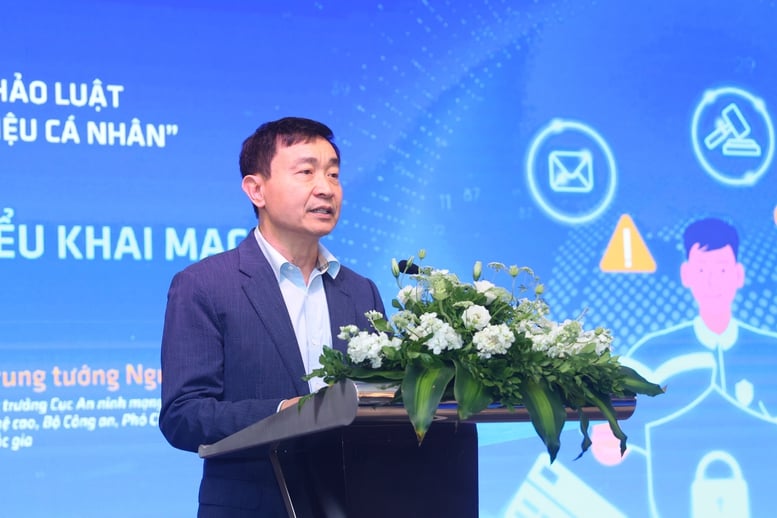
Lieutenant General Nguyen Minh Chinh, Director of the Department of Cyber Security and High-Tech Crime Prevention and Control, Ministry of Public Security
On April 23, the National Cyber Security Association held a seminar on "Comments on the Draft Law on Personal Data Protection". This draft law is posing urgent requirements for its construction and completion in the context of Vietnam entering a period of accelerating digital transformation.
This is an important step in institutionalizing human rights and civil rights, in line with the orientation of "taking people as the center, goal and driving force" set forth in Resolution No. 27-NQ/TW dated November 9, 2022 of the Central Committee. The development of the Law not only meets internal needs, but also meets the requirements of international integration, ensuring national digital sovereignty.
More than 140 countries have regulations on personal data protection.
At the workshop, Lieutenant General Nguyen Minh Chinh, Permanent Vice President of the National Cyber Security Association, Director of the Department of Cyber Security and High-Tech Crime Prevention, Ministry of Public Security, said that information technology is increasingly spreading into people's lives, users are providing more and more information and personal data to cyberspace and to service providers, from basic information to information reflecting biometrics, psychology, thoughts and actions.
The prevalence of personal data in cyberspace is directly proportional to the consequences that occur when personal data is not adequately and properly protected. Meanwhile, awareness of personal data protection is limited; much biometric information, personal history, relationships, health status, and finances are posted publicly, becoming data sources for automated information collection programs.
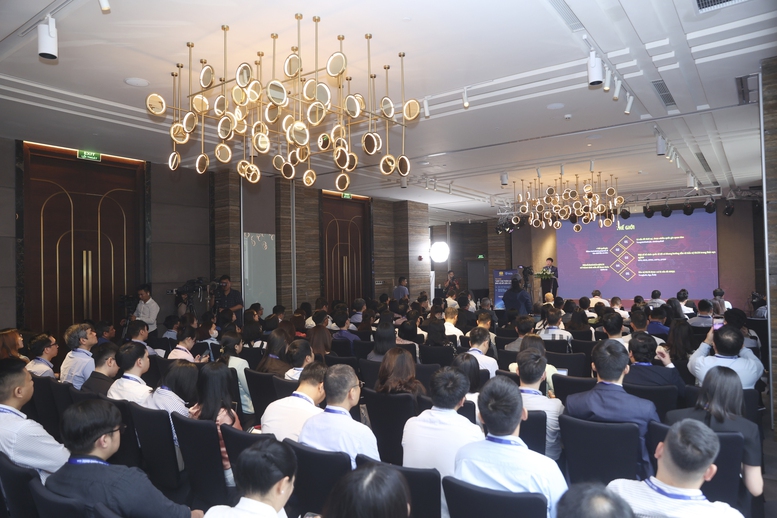
Overview of the workshop - Photo: VGP/HM
The situation of personal information being leaked, stolen, and traded on cyberspace also occurs frequently. More and more entities are collecting, analyzing, and processing personal data for various purposes without notifying customers or allowing violations of personal data protection to occur.
Many new services have appeared on cyberspace, collecting, exploiting, and analyzing information and personal data, but there is no mechanism to manage user data, raising many issues related to national security, social order and safety, and infringing on the rights and legitimate interests of organizations and individuals.
According to Lieutenant General Nguyen Minh Chinh, more than 140 countries in the world have issued legal documents on personal data protection, most recently India, Thailand and Malaysia.
"Vietnam cannot delay any longer in promulgating this Law. The Ministry of Public Security has urgently advised the Government to submit to the National Assembly the draft Law on Personal Data Protection for consideration and approval at the 9th session of the 15th National Assembly next May," Lieutenant General Nguyen Minh Chinh emphasized.
The legal system on data protection is still fragmented.
At the workshop, from the perspective of policy management, Ms. Le Nguyen Thien Nga, Director of the Institute for Policy Management and Development Strategy, chief researcher of the national data strategy scientific workshop series, said that the Law on Personal Data Protection in the context of data economic development, attracting international investment and digital transformation of Vietnam needs to ensure a balance between privacy protection and data usage needs of organizations and businesses.
Ms. Nga proposed a framework to adjust the draft Law in the direction of post-inspection rather than pre-inspection; there are controlled testing mechanisms in a number of areas providing services to the data market and testing mechanisms for humanitarian volunteer organizations operating in search, relief and rescue. It is important to have clear zoning and priorities for specific and specialized areas such as personal data in healthcare, education, finance, insurance, etc.
Viettel Group's representative also shared the difficulties and proposed to add a mechanism to control the abuse of data subject rights, allowing for agreement on the time limit for exercising data subject rights, charging reasonable fees and refusing unreasonable requests; clearly stating that "Personal data cannot be bought or sold unless the data subject agrees".
Several businesses also presented practical experiences in complying with personal data protection requirements at technology businesses.
In general, delegates agreed that personal data is closely linked to human rights and civil rights, and has a profound impact on cyber security, national security, and the entire digital ecosystem. Meanwhile, the current legal system on data protection is fragmented and lacks consistency.
According to statistics, there are currently 69 legal documents referring to personal data, but only Decree 13/2023/ND-CP is the first document to provide a relatively complete definition and principles of data protection.
Previously, this Draft was developed by the Ministry of Public Security in the spirit of being extremely open-minded, carefully studying international experience; widely soliciting comments from domestic and foreign agencies, organizations and individuals; conducting surveys of a number of agencies and enterprises in important fields with large-scale personal data processing activities...
Major Dao Duc Trieu, Deputy Secretary General of the National Cyber Security Association (NCA), informed that the draft Law on Personal Data is oriented to be built in the spirit of continuing Decree No. 13/2023/ND-CP of the Government on personal data protection, but at a higher, synchronous and fundamental level.
The draft consists of 7 chapters and 69 articles, fully regulating the following contents: principles of data processing, rights and obligations of data subjects and related parties, data transfer abroad, data impact assessment, data protection credit rating, handling of violations and inspection and monitoring mechanisms.
The Law also regulates regulations related to foreign organizations and individuals engaged in collecting and processing data on Vietnamese citizens.
Hien Minh
Source: https://baochinhphu.vn/cap-bach-ve-hoan-thien-du-thao-luat-bao-ve-du-lieu-ca-nhan-102250423150831954.htm


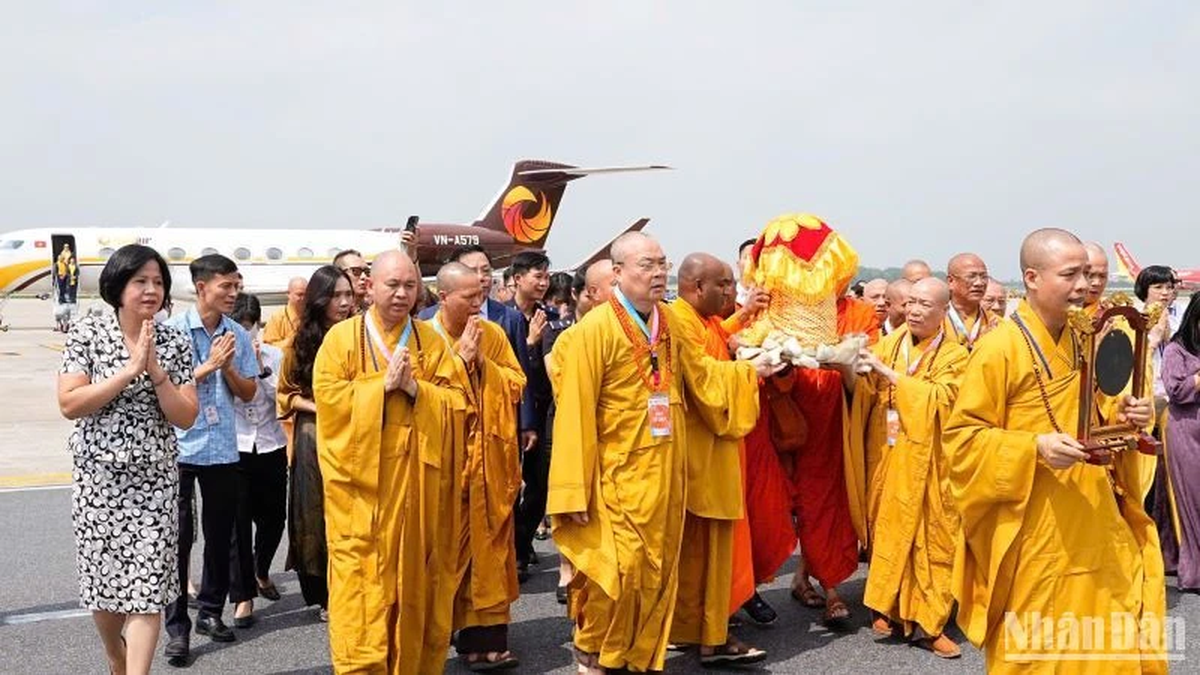
![[Photo] President Luong Cuong awarded the title "Heroic City" to Hai Phong city](https://vphoto.vietnam.vn/thumb/1200x675/vietnam/resource/IMAGE/2025/5/13/d1921aa358994c0f97435a490b3d5065)
![[Photo] President Luong Cuong attends the inauguration of the international container port in Hai Phong](https://vphoto.vietnam.vn/thumb/1200x675/vietnam/resource/IMAGE/2025/5/13/9544c01a03e241fdadb6f9708e1c0b65)

![[Photo] Prime Minister Pham Minh Chinh receives Ambassador of the French Republic to Vietnam Olivier Brochet](https://vphoto.vietnam.vn/thumb/1200x675/vietnam/resource/IMAGE/2025/5/13/f5441496fa4a456abf47c8c747d2fe92)
![[Photo] Many people in Hanoi welcome Buddha's relics to Quan Su Pagoda](https://vphoto.vietnam.vn/thumb/1200x675/vietnam/resource/IMAGE/2025/5/13/3e93a7303e1d4d98b6a65e64be57e870)





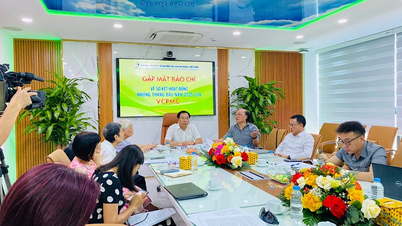




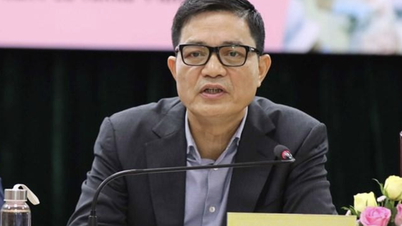





























































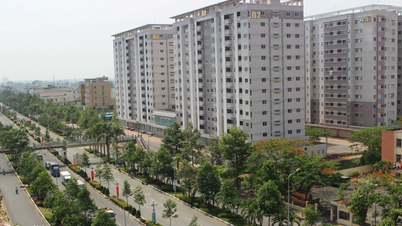

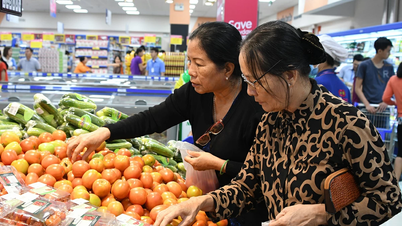










Comment (0)